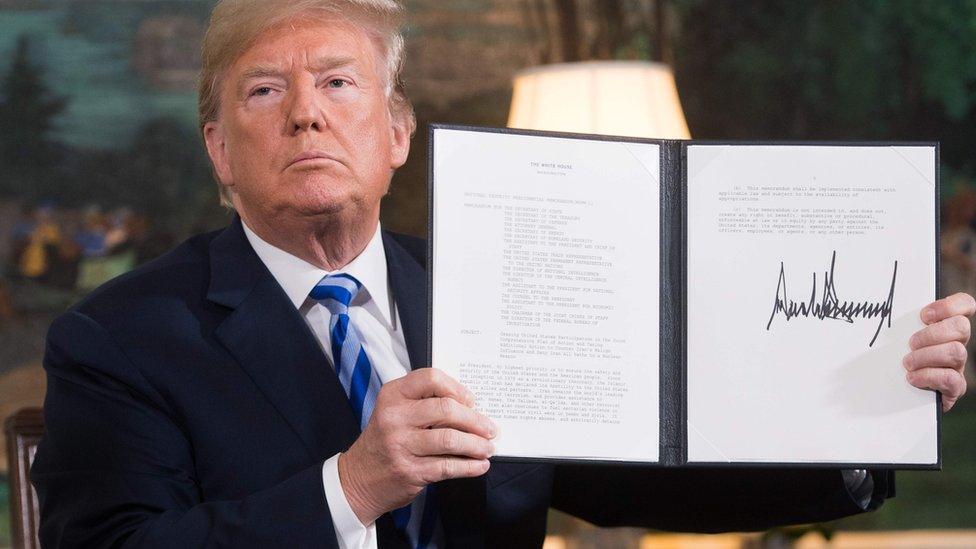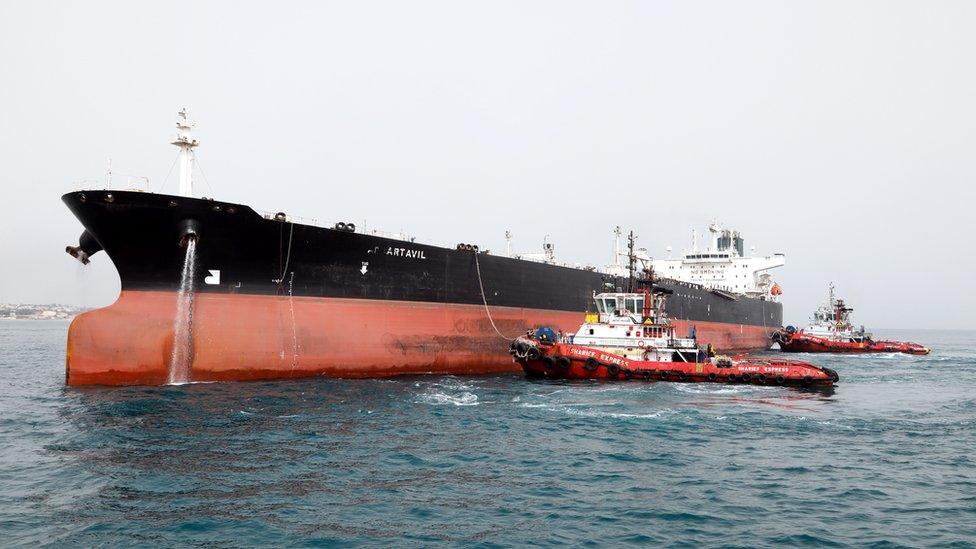Trump administration to reinstate all Iran sanctions
- Published

President Trump began reinstating sanctions on Iran in May
The Trump administration is to reinstate all US sanctions on Iran removed under the 2015 nuclear deal.
The White House said it was "the toughest sanctions regime ever imposed" on Tehran. It targets both Iran and states that trade with it.
However, temporary waivers will be granted to eight countries to allow them to continue importing Iranian oil.
Iran's Supreme Leader Ayatollah Ali Khamenei said the move "disgraced" US prestige and liberal democracy.
"The challenge between the US and Iran has lasted for 40 years so far and the US has made various efforts against us: military, economic and media warfare," Mr Khamenei wrote on Twitter on Saturday.
"This new US president has disgraced the remnant of America's prestige," he said, adding that "America today is far weaker", suggesting that US military power was beginning to "wane and deteriorate".
Washington is to reintroduce the sanctions on Monday 5 November.
Meanwhile, EU states that backed the nuclear deal have said they will protect EU firms doing "legitimate" business with Iran.
President Donald Trump withdrew from the agreement in May, describing it as "defective at its core" because it had not stopped Iran developing a ballistic missile programme and intervening in neighbouring countries.
"Sanctions are coming," he tweeted after Friday's announcement, referencing the TV series Game of Thrones and its motto "Winter is coming".
Allow X content?
This article contains content provided by X. We ask for your permission before anything is loaded, as they may be using cookies and other technologies. You may want to read X’s cookie policy, external and privacy policy, external before accepting. To view this content choose ‘accept and continue’.

The US has been gradually re-imposing sanctions, but analysts say this move is the most important because it targets the core sectors of Iran's economy.
The agreement saw Iran limit its controversial nuclear activities in exchange for sanctions relief.
Barack Obama, the US president at the time, had argued the deal would prevent Iran from developing nuclear arms.
The UK, France, Germany, Russia and China were also parties to the 2015 accord and have stuck to it, saying Iran is complying.
What action is being taken?
The US sanctions will cover shipping, shipbuilding, finance and energy.

Iran's oil industry faces new restrictions
More than 700 individuals, entities, vessels and aircraft will be put on the sanctions list, including major banks, oil exporters and shipping companies.
US Treasury Secretary Steven Mnuchin also said that the Brussels-based Swift network for making international payments was expected to cut off links with targeted Iranian institutions.
Being disconnected from Swift would almost completely isolate Iran from the international financial system.
They are the second lot of sanctions re-imposed by Mr Trump since May.
US Secretary of State Mike Pompeo set out 12 demands that Iran must meet if sanctions are to be lifted - including ending support for militants and completely ballistic missile development.
What exemptions are being made?
Mr Pompeo did not name the eight countries that been granted waivers to continue importing Iranian oil.
He said the eight had "demonstrated significant reductions in their crude oil and co-operation on many other fronts". Two would eventually stop imports and the other six greatly reduce them, he added.
US allies such as Italy, India, Japan and South Korea are among the eight, external, the Associated Press news agency reports. Turkey also obtained a waiver, Reuters says.
All have been have been top importers of Iranian oil.
How did Iran respond?
Foreign ministry spokesman Bahram Qasemi told state TV that Iran had "the knowledge and the capability to manage the country's economic affairs".
He said there was "no possibility" that the US "will attain its political goals through such sanctions".
What do EU states say?
In a joint statement, the foreign ministers of the UK, Germany and France, and EU foreign affairs chief Federica Mogherini said they "deeply" regretted the US decision, external to restore sanctions.
"We are determined to protect European economic operators engaged in legitimate business with Iran, in accordance with EU law and with UN Security Council resolution 2231," they said.

Balancing act
By Barbara Plett Usher, BBC News, Washington
Over the past six months the Trump administration has pushed a goal of getting Iranian oil exports as close to zero as possible. But the balance between supply and demand in the oil market is fairly tight, so it has to calibrate accordingly.
It does not want to drive all the Iranian oil off the market on 5 November because that could spike prices. This would benefit Iran, and anger Americans at the petrol pumps.
The US has increased its own production to fill in the gap left by Iran's oil and urged others to as well, especially Saudi Arabia.
It has also granted permission to eight countries to continue imports of Iranian oil after intense lobbying by some of them. Officials haven't said which ones yet, but the list is expected to include India and possibly China, two of Iran's biggest customers.
But this is at reduced levels and only for six months, at which point the administration will reassess the oil markets. And the money from these sales will go into an escrow account to be used for permitted goods and services, so Iran won't get the cash.
Results so far show what the US can achieve with the big stick of its enormous economic power. But isolating Iran through force alone, absent the united political front of its previous partners, will continue to require a balancing act.